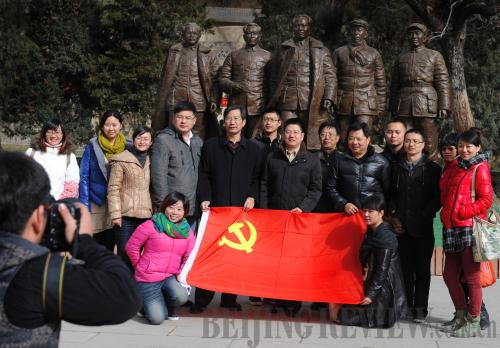|
 |
|
COMMON LEGACY: Visitors pose in front of statues of revolutionary leaders on November 3 in Yan'an, a former base of the CPC in northwest China's Shaanxi Province (TAO MING) |

The 18th National Congress of the Communist Party of China (CPC) conveyed a clear message that the CPC will stick to its chosen path. The political and economic systems underlying China's ascent will be crucial to the future progress of the world's most populous nation, said Xie Chuntao, a professor with the Party School of the CPC Central Committee and editor of the recent bestseller Governing China: How the CPC Works, in an interview with Beijing Review. Excerpts follow:
Beijing Review: What are the main messages from General Secretary Hu Jintao's report at the 18th CPC National Congress?
Xie Chuntao:In my view, it delivers four messages. First, the CPC is fully aware of the challenges it faces. When reviewing the past 10 years since the 16th CPC National Congress, Hu dwelled upon problems such as income gaps and the corruption of government officials, while only briefly mentioning the achievements. Second, the report shows the CPC's confidence about socialism with Chinese characteristics, a theory that has made it possible for China to achieve rapid development over the past three decades. Third, the CPC is determined to follow this theory in the years to come. It will neither impose self-isolation nor abandon socialism to take an erroneous path. Fourth, the CPC will tackle difficult problems with a pioneering spirit. As it works to accomplish the goal of building of a moderately prosperous society in all respects by 2020, it will focus on tasks such as deepening reforms, changing China's growth model and protecting the environment.
How will the CPC carry out political restructuring in China in the years ahead?
The CPC will not conduct political reforms based on Western standards. Instead it will implement a wide range of reforms while upholding China's basic political systems such as the people's congress system and the system of CPC-led multi-party cooperation and political consultation. For instance, apart from improving democratic elections, the CPC will continue to underline the importance of democratic consultation through which different social groups and political parties forge consensus. Since it has put in place a socialist legal system, China is stepping up efforts to ensure judicial impartiality and safeguarding citizens' lawful rights. Under the leadership of the CPC, it will also improve the self-governance systems of rural villages and urban communities. Moreover, the CPC and the government will put officials under stricter scrutiny to prevent corruption.
Why is a "socialist market economy" essential to China's growing prosperity in recent decades?
Unlike other market economic models, China's socialist market economy emphasizes state planning and the pursuit of equity. Since the invisible hand of the market does not always work well, the government's visible hand is needed.
The CPC and the Chinese Government see great value in regulating the market with economic, legal and administrative tools to ensure its healthy development. While many other economies bore the brunt of the devastating global financial crisis, China's socialist market system has shown great resilience as China pools resources across the country to cope with the crisis. The system combines the advantages of China's political system with those of a competitive market economy.
Western media often investigate the legitimacy of the CPC's leadership in China. What is your take?
The CPC acquired legitimacy as the ruling party of China as it led the Chinese people in founding the People's Republic of China. With the passage of time, however, political dividends brought about by revolution are disappearing. Now the CPC has come to recognize the pressing need to seek new sources of legitimacy. People supported and participated in the Chinese communist revolution because the CPC promised a new society where everybody lives a happy life. After the revolution, hopes were high for the Party to honor its promise.
Since it came to power in 1949, especially since it adopted the reform and opening-up policy in 1978, the CPC has pushed for all-round economic, political, cultural and social development in China. It has set a series of goals, including realizing modernization and building a moderately prosperous society. As it keeps advancing toward these goals, its leadership position has strengthened.
| 